The complete guide to WhatsApp marketing
Published on March 24, 2025/Last edited on April 10, 2025/30 min read
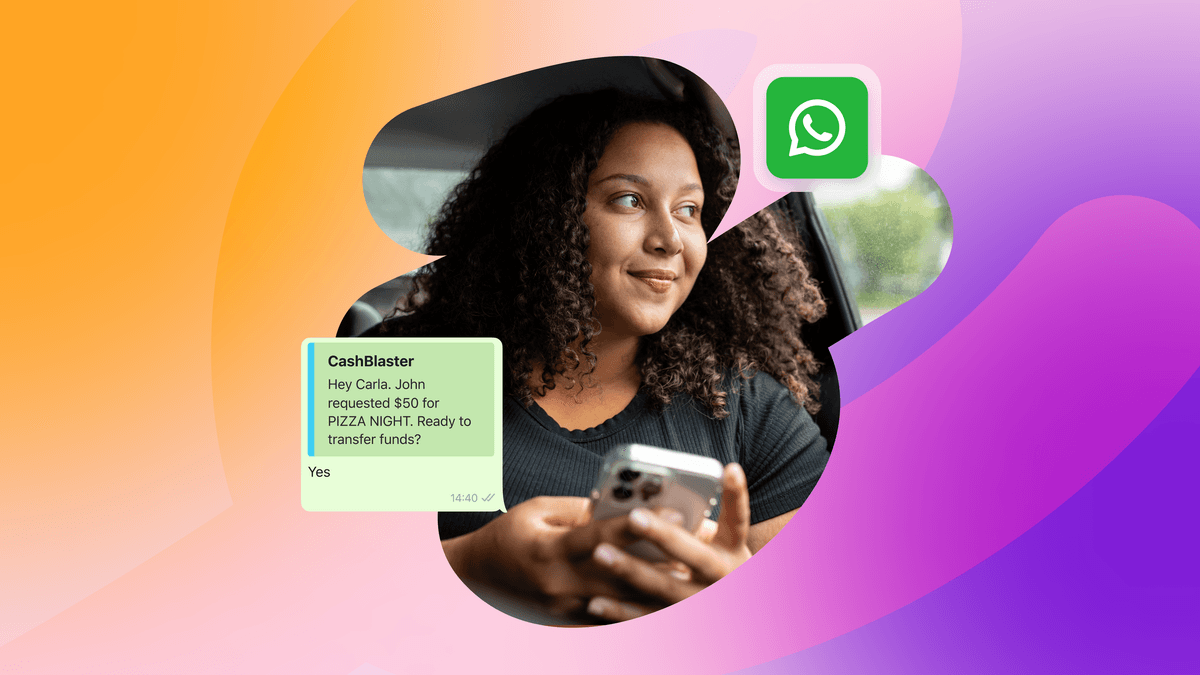

Team Braze
With more than 2 billion users in over 180 countries, WhatsApp Messenger is the most widely used mobile messaging app in the world. But for brands, it’s more than just a chat tool—it’s a high-impact marketing channel that can drive engagement, boost conversions, and build long-term customer relationships.
Compared to other marketing channels, WhatsApp Business Platform drives 89% higher purchases per user. Its global reach, high read rates, and interactive messaging make WhatsApp an essential part of any customer engagement strategy.
WhatsApp marketing is all about creating 1:1 connections at scale. It allows brands to have powerful and impactful conversations with customers, on the platform they already use daily. Whether you're considering WhatsApp alongside email, push notifications, in-app messaging, or social media, you're in good company.
So, how can you make WhatsApp work for your brand? Let’s break it down:
Who is Whatsapp marketing for?
Why use WhatsApp for marketing?
How to get started with WhatsApp marketing in 5 steps
5 reasons to choose WhatsApp marketing
Practical WhatsApp marketing strategies
3 high-impact WhatsApp marketing use cases
4 real-life examples of WhatsApp Marketing
What is WhatsApp marketing?
WhatsApp marketing is all about connecting with customers where they already are. It’s a memorable way to promote your brand, reach a massive audience, and build real relationships.
WhatsApp makes it easy to have authentic, two-way conversations with your customers—the kind of personalized, interactive experience they actually want. Features like quick reply buttons make it easy for customers to respond with just a tap, while call-to-action buttons make it effortless to send people straight to your app or website to complete high-value actions. It’s all about making engagement simple, seamless, and effective.
WhatsApp can help brands create robust, interactive in-thread experiences with features like:
- Interactive list messages: that allow your customers to view options and make selections directly in the WhatsApp thread.
- WhatsApp Flows: WhatsApp Flows help brands increase conversions and boost retention by facilitating convenient, seamless interactions with their customers using customizable, actionable forms. With this feature, marketers can easily collect sign-ups, conduct surveys, recommend products, help customers book services, capture leads, and more—directly within a WhatsApp conversation.
- WhatsApp Commerce: Use your Meta Catalog to easily create dynamic, eye-catching WhatsApp messages that show off your products & services and increase conversions.
- Carousel messages: Drive more conversions with stunning carousel messages that maximize your message real estate with room for multiple images and buttons.
- Limited time offer messages: Create a sense of urgency and help your promotions stand out with messages that include a ‘Limited-Time Offer’ badge.
Who is WhatsApp marketing for?
WhatsApp marketing isn’t just for eCommerce—it’s an effective tool across industries. Whether you're in Retail, Finance, Travel and Hospitality, QSR and On demand, or Media and Entertainment, WhatsApp helps brands connect, convert, and retain customers with personalized messaging.
Best-fit industries for WhatsApp marketing:
- Retail and eCommerce: Send personalized promotions, abandoned cart messages, and exclusive discounts. Create in-thread shopping experiences with WhatsApp Commerce.
- Financial Services: Provide real-time transaction alerts, fraud notifications, and important account updates.
- Travel and Hospitality: Send booking confirmations, flight updates, and personalized offers. Use WhatsApp Flows to help customers book reservations.
- Media and Entertainment: Share tailored content recommendations, event reminders, and subscription renewal alerts. Use interactive list messages to ask customers about their preferences for future personalization..
- QSR & On-Demand: Automate order confirmations, delivery tracking, and loyalty rewards.
- Healthcare and Wellness: Offer appointment reminders, test result notifications, and telehealth support.
How to use WhatsApp for marketing?
WhatsApp stands out as a marketing channel because although it’s most well-known as a peer-to-peer messaging app, it’s capable of much more than that. It’s a powerful, interactive channel that helps brands connect with customers in a more engaging and personalized way.
For eCommerce brands, it lets you showcase your products or services with images and videos, descriptions, prices, and calls-to-action in a visually appealing way. You can answer FAQs instantly, greet new customers automatically, and send important updates even when you’re offline. With so many people already using it, and finding it engaging, it can outperform other marketing channels when it comes to driving sessions and purchases.
Brands can capture their audience’s attention with rich media and quick reply buttons, and then use dynamic calls-to-action to make it easy for users to return to their app or website. With WhatsApp Commerce and WhatsApp Flows, brands can even create rich, in-thread experiences that allow customers to shop and complete other tasks without ever leaving the WhatsApp platform.
The numbers speak for themselves
In the Braze 2024 Global Customer Engagement Review, marketers told us that of all the messaging channels they plan to use, messaging apps like WhatsApp are the #1 channel. And it’s no surprise, given the strong results WhatsApp is driving for brands, including 72% higher sessions per user, compared to other marketing channels.
For retail, eCommerce, and QSR brands, WhatsApp can be a game-changer. Businesses can showcase products & services with rich imagery and videos, and simplify the ordering process with interactive features like quick reply buttons and calls-to-action—removing friction and enhancing the customer experience. For Financial Services and Travel brands, features like WhatsApp Flows and the ability to send documents means they can create seamless, convenient experiences—without ever making their customers leave a WhatsApp conversation.
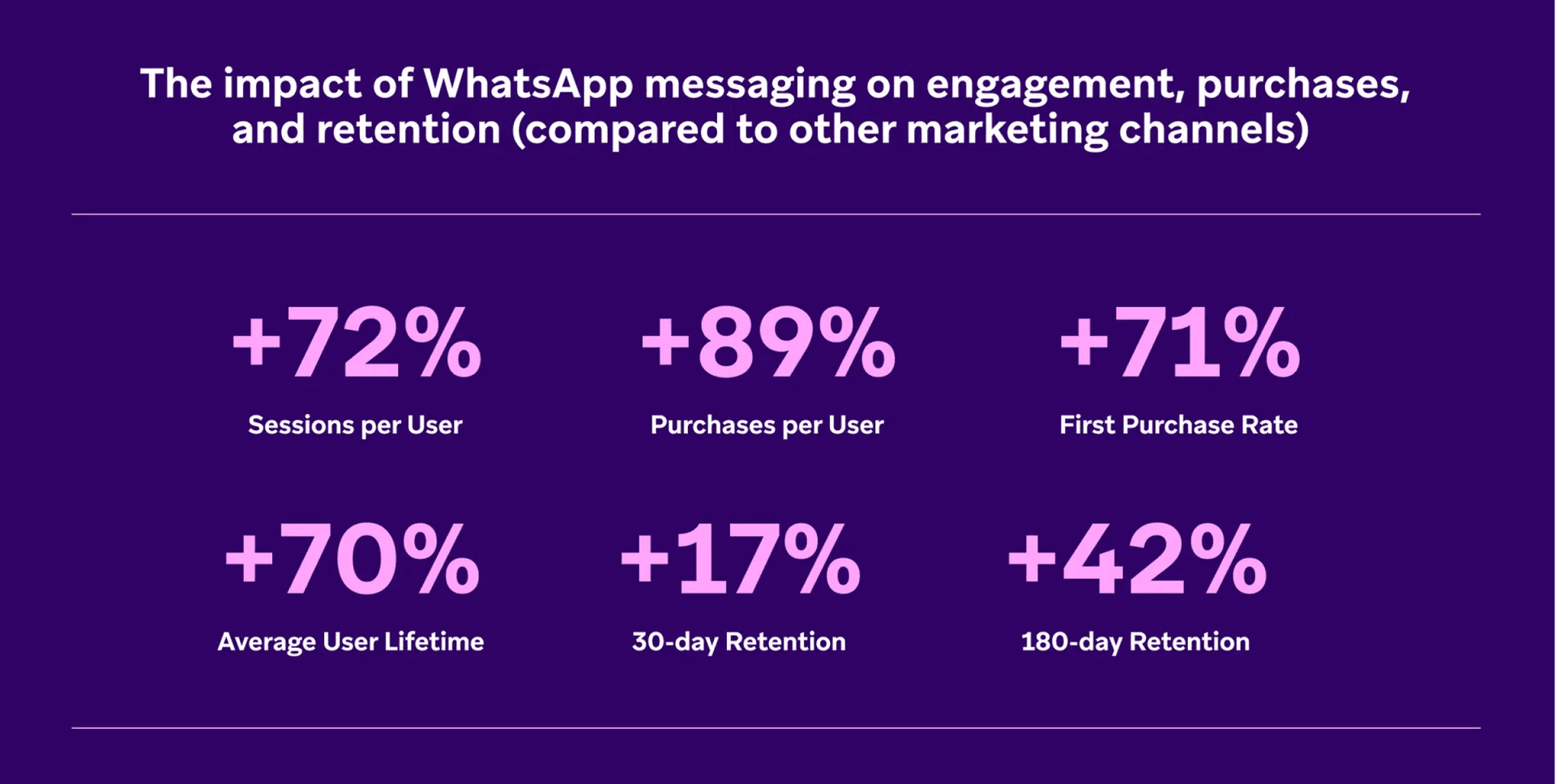
A long-term engagement tool across industries
While WhatsApp is particularly impactful for eCommerce and service-driven brands, its benefits extend far beyond. For businesses in Media and Entertainment, Financial Services, or Travel and Hospitality, WhatsApp is a key driver of long-term customer retention, boosting six-month retention rates by 42% and increasing average user lifetime by 70% compared to other channels.
Brands in these industries can leverage WhatsApp to:
- Recommend personalized content based on user preferences
- Send transactional messages that add value, like booking reminders, fraud alerts, and account updates
- Upsell and cross-sell customers with add-ons and personalized offers
- Account updates
With its ability to facilitate real-time, meaningful interactions, WhatsApp is not just another marketing channel—it’s a platform that builds stronger, more engaged customer relationships over time.
How to get started with WhatsApp marketing in 5 steps
1. Create your WhatsApp Business Account
- Choose a provider that offers a convenient embedded sign-up flow.
- Create your profile, complete business verification, and become an Official Business Account.
2. Get customer opt-ins
- WhatsApp requires explicit consent before sending marketing messages.
- Promote your WhatsApp program and collect opt-ins via your website, landing page, phone number capture form, or social media links.
3. Segment your audience
- Use purchase history, engagement levels, demographics, and other first-party customer data to segment users.
- Example: Send VIP-only offers to repeat customers and welcome journeys to new users.
4. Set up automated and personalized messages
- Use quick replies and calls-to-action to create interactive messages and streamline communication.
- Example: If a customer abandons their cart, trigger an automated reminder with a discount and a link that takes them back to the specific product page.
5. Measure performance and optimize
- Track key metrics like read rates, click-through rates, and conversions.
- A/B test message timing, formats, and CTA placements to improve engagement.
Pro Tip: Start with simple promotional campaigns before moving to more complex multi-step journeys.
Watch our webinar to explore how the marketing team at Max leverages this powerful channel to craft highly interactive, relevant, and personalized campaigns.
5 benefits of WhatsApp marketing
Whether you’re looking to reach customers where they are, build stronger relationships, scale globally, or improve key marketing metrics, WhatsApp offers a lot of potential.
Here’s why it should be a key part of your marketing strategy:
1. Connect with customers where they are
One of the biggest challenges for marketers is getting and keeping customers engaged. The best way to do that? Meet them where they already spend their time—and for billions of people, that place is WhatsApp.
With over 2 billion active users, WhatsApp is the #1 messaging app in the world, with many people interacting directly with brands on WhatsApp every day—whether they’re sending inquiries, browsing business profiles, or getting support. If your customers are already using WhatsApp daily, why not make it easy for them to interact with your brand there too?
2. Create meaningful conversations
Great marketing isn’t just about sending messages—it’s about starting conversations. WhatsApp is built for two-way communication, making it perfect for brands that want to engage customers in a more interactive and personalized way.
Unlike traditional marketing channels like SMS or email, WhatsApp allows for real-time, dynamic conversations. Businesses can use this to learn more about their customers, answer questions instantly, and create personalized experiences. Whether it’s gathering feedback, recommending products, or providing tailored support, WhatsApp helps you build stronger, more authentic relationships with your audience.
3. Scale your marketing efforts globally
For global brands, choosing the right communication channels can be tricky. Some platforms work better in certain regions than others, making it difficult to reach audiences worldwide. But WhatsApp is different—it’s one of the few platforms with massive global reach.
With a penetration rate of over 85% in regions like Asia Pacific, parts of Europe, and Latin America, WhatsApp is an ideal channel for businesses looking to connect with international audiences outside of the US. No matter where your customers are, WhatsApp provides a consistent and effective way to engage them.
Note, starting April 1, 2025, WhatsApp is pausing marketing message sending in the US. Learn more about the change.
4. Drive conversions and increase customer lifetime value
WhatsApp is also strong at converting customers. The platform’s rich features, including quick reply buttons, multimedia messaging, and interactive calls-to-action, allow brands to create highly engaging campaigns that capture attention and drive action.
With the right approach, WhatsApp can be used to:
- Create appealing onboarding campaigns to activate more customers
- Drive upsells and cross-sells with messages that show off your products & services Recover lost sales with abandoned cart reminders
- Gather valuable feedback with quick, in-thread surveys
- Encourage referrals with easy sharing options
- Boost customer loyalty with helpful transactional reminders
- Win-back dormant customers with compelling messages
When combined with AI-powered optimization and advanced segmentation, WhatsApp helps brands deliver the right message to the right customer at the right time, increasing both conversion rates and customer lifetime value.
5. Get more from your marketing budget
Marketing budgets are often under pressure, and brands need to maximize ROI by focusing on the most cost-effective and high-impact channels. WhatsApp allows businesses to streamline their customer engagement efforts or paid ads.
By integrating WhatsApp into your cross-channel marketing strategy, you can:
- Lower customer acquisition costs by leveraging direct messaging
- Improve engagement by using a channel customers actually want to interact with
In short, WhatsApp helps businesses cut through the noise, connect with customers efficiently, and get the most out of their marketing spend.
Practical WhatsApp marketing strategies and advice
WhatsApp is an effective tool for engaging customers, driving conversions, and building long-term relationships. But to get the most out of it, you need a well-planned strategy. Here’s how to set up and optimize your WhatsApp marketing efforts.
1. Grow your WhatsApp subscriber list
Before you can send marketing messages via WhatsApp, you need explicit opt-ins from customers. That means your first priority should be building a strong subscriber base.
Here are some effective ways to promote your WhatsApp presence and encourage opt-ins:
- Use WhatsApp’s built-in tools: Share QR codes and short links across your website, emails, socials, and in-store displays to make signing up effortless.
- Leverage social media: Add WhatsApp action buttons to your Facebook and Instagram profiles and shops to encourage followers to connect.
- Run Ads That Click to WhatsApp: Paid ads can help you attract both new customers and existing ones who haven’t opted in yet.
Other advice to help you see success in your WhatsApp marketing:
- Highlight the benefits: Let users know what they’ll gain by signing up—exclusive deals, early access to promotions, order updates, or VIP perks.
- Offer incentives: A discount, free trial, or special offer can be a great motivator for sign-ups.
- Positioning your WhatsApp experience as an exclusive, high-value channel can significantly boost your subscriber numbers.
2. Follow WhatsApp’s opt-in rules
WhatsApp has strict guidelines for how businesses collect opt-ins, and failing to comply can limit your ability to send messages. Here’s what to keep in mind:
- Get explicit consent: Users must clearly agree to receive messages from your brand. Note: While WhatsApp recently removed their channel-specific opt-in requirement, it is a best practice to collect opt-in specifically for the WhatsApp channel for maximum engagement.
- Be transparent: Clearly state who you are and what type of messages they can expect.
- Follow legal requirements: Comply with all regional data privacy laws.
By adhering to these guidelines, you’ll maintain trust and engagement, setting the stage for effective and sustainable WhatsApp marketing.
3. Scale your messaging effectively
WhatsApp limits how many business-initiated conversations you can send within a 24-hour period, but these limits increase over time as you establish a good sending reputation. Here’s how to expand your messaging capacity:
- Complete Meta’s business verification: This confirms your business identity and unlocks higher messaging limits.
- Maintain a strong quality rating: WhatsApp assigns a Low, Medium, or High rating to your phone number. A lower rating (caused by too many users blocking or reporting your messages) can limit your ability to scale.
- Ensure your phone number status remains ‘Connected’: If your rating drops too low, your number may become flagged, preventing you from increasing your limits.
By following best practices and keeping engagement levels high, you can gradually scale up from 1K to 10K, 100K, and eventually unlimited messaging capacity.
4. Integrate WhatsApp into your cross-channel strategy
WhatsApp works best as part of a broader customer engagement strategy, rather than a standalone channel. WhatsApp should be woven into a seamless, cross-channel approach—as WhatsApp is a more premium channel, we recommend pairing it with more cost-effective channels like push and in-app messages.
For example, you could:
- Use WhatsApp for interactive, quick engagement, while email provides in-depth content.
- Send personalized WhatsApp messages after key interactions, such as purchases or abandoned carts. Pair these with emails that recommend items based on those purchases, or push notifications that let customers know when items they might like go on sale.
- Create a high-touch onboarding campaign to collect information and guide customers through the values and benefits of your product or service, utilizing the channels that make most sense for your brand, like a combination of email, WhatsApp, and in-app messages.
By taking an integrated approach, you increase your reach, improve customer retention, and boost conversions.
5. Personalize your WhatsApp campaigns for maximum impact
Personalization is key to higher engagement and stronger results. Customers expect messages that are relevant, timely, and tailored to their interests, preferences, and behaviors.
Here’s how to make your WhatsApp campaigns more personal:
- Leverage customer data: Use insights from past interactions, preferences, and behaviors to send more relevant messages.
- Segment your audience: Segment users based on factors like purchase history, location, or engagement levels to send more targeted campaigns.
- Use dynamic content: Personalize messages with product recommendations, special offers, loyalty points, or other elements tailored to each user.
- Trigger at the right moments: Send timely WhatsApp notifications for things like order updates, event reminders, or exclusive deals.
By harnessing first-party customer data and relevant insights, brands can create WhatsApp experiences that feel personal, valuable, and engaging.
Learn how to create and deliver experiences with tools like Amazon Personalize and Braze that generate stronger loyalty, higher retention, and more revenue.
3 High-impact WhatsApp marketing use cases
Brands across many different industries are using WhatsApp to drive key customer actions. Here are some of the most effective ways to take advantage of the platform.
1. Getting customers onboarded: The "you didn’t quite finish setting up" campaign
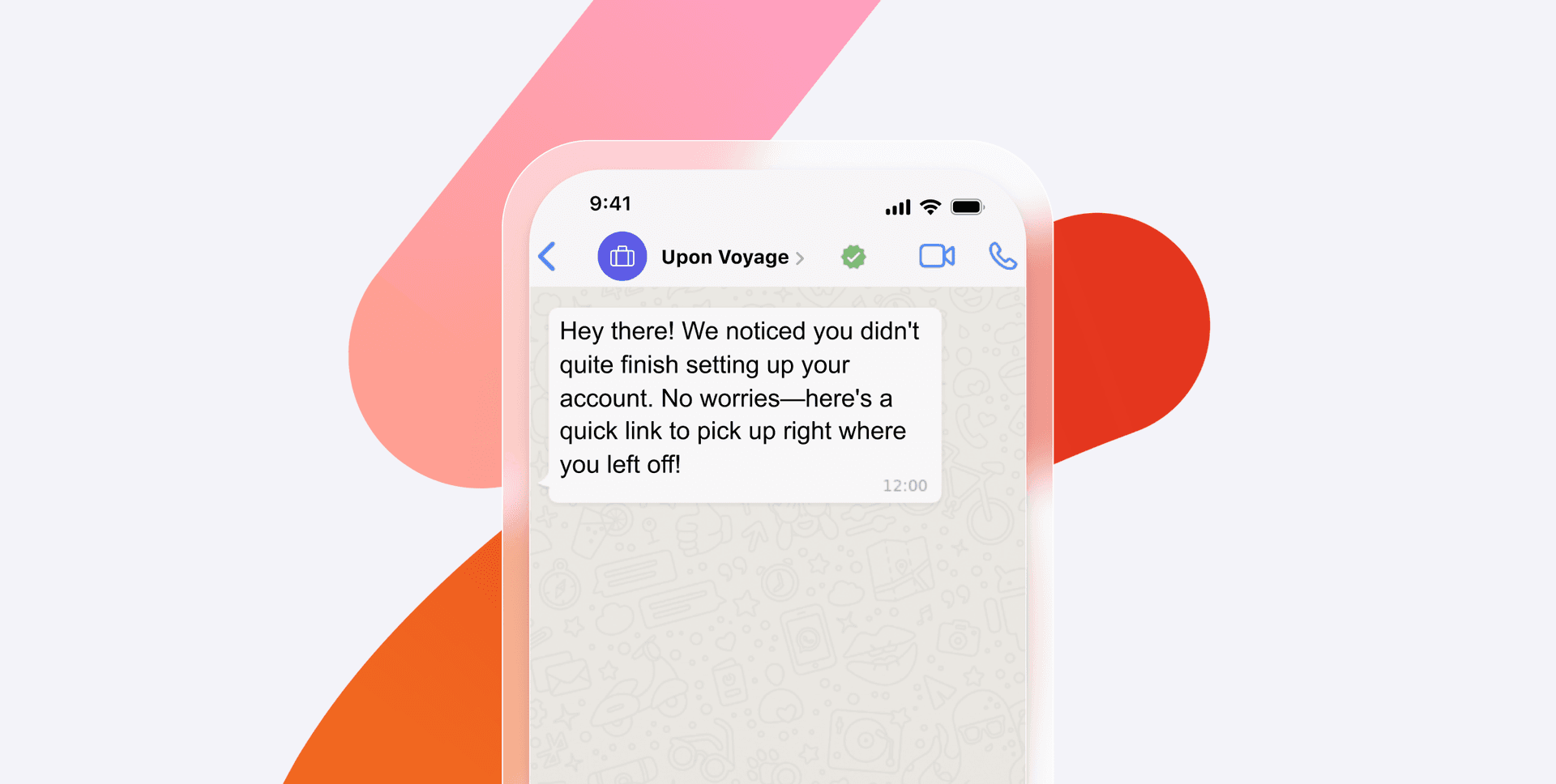
You know how it goes - someone downloads your app or signs up on your website, but then... crickets. They don't finish setting up their account, meaning they can’t realize the full value of your product or service. Frustrating, right? Well, here's where WhatsApp can save the day!
Imagine you're running the customer engagement program for a cool travel startup called "Upon Voyage". You could trigger a friendly WhatsApp message to those almost-customers, saying, "Hey there! We noticed you didn't quite finish setting up your account. No worries—here's a quick link to pick up right where you left off!"
WhatsApp lets you do all sorts of interactive stuff too. You can use quick reply buttons to gather info right in the chat to reduce drop off. You’re able to have a conversation with each customer, but in a much more efficient way.
Pro Tip: Getting folks to finish signing up can actually save you money on customer acquisition costs. Plus, collecting more customer preferences up front helps you create a more personalized experience for them down the line. It’s a win-win!
2. Boosting sales: The "don't forget your stuff!" campaign
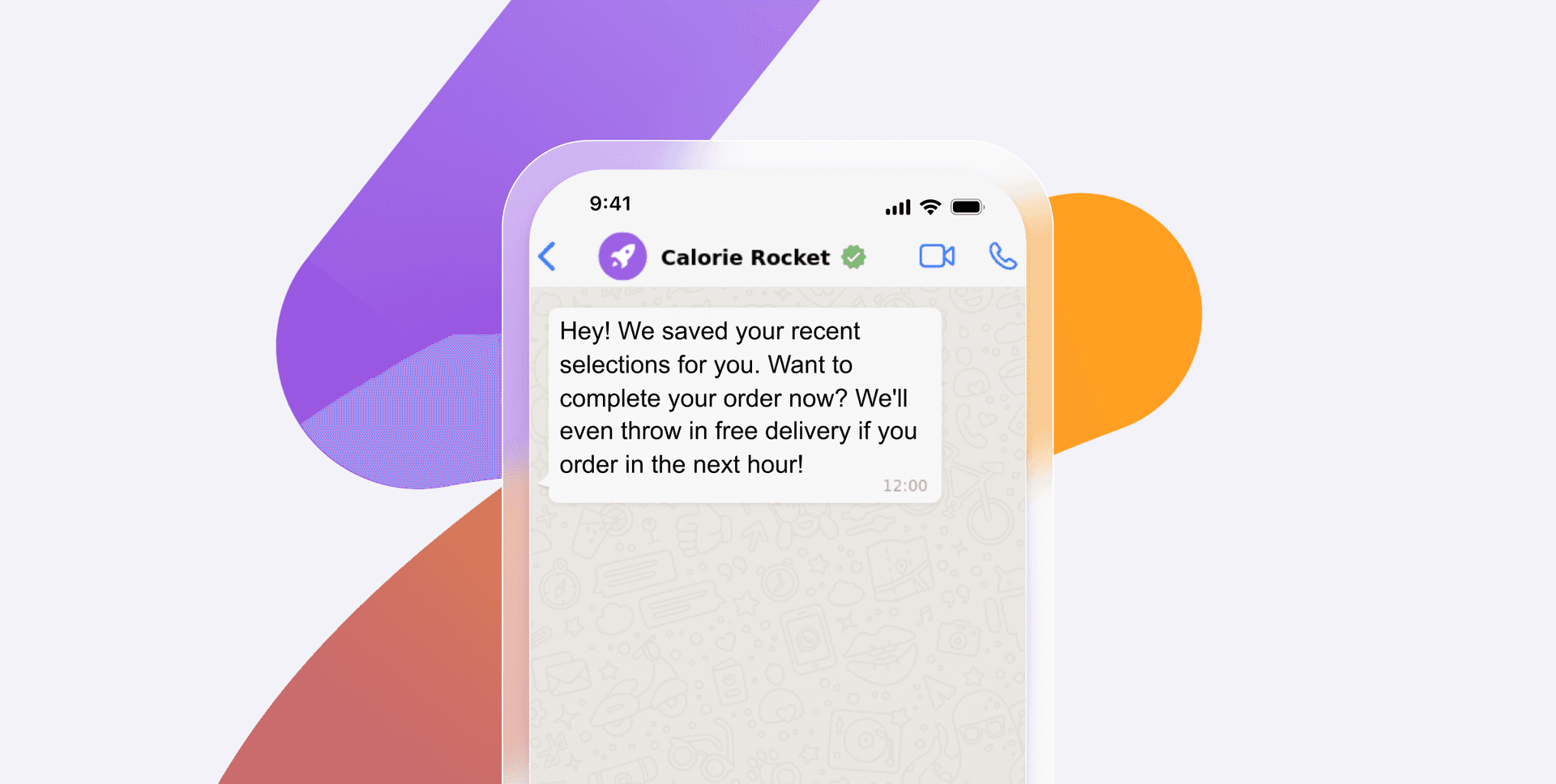
We’ve all done it—gone online shopping, added things to our cart and then gotten bored, distracted, or changed our minds. So we leave the website and forget about it. This is where WhatsApp can really shine.
Let's say you're on the CRm team for a food delivery service called "Calorie Rocket". Your team notices there has been an uptick in abandoned carts in the last month and you're tasked with addressing it. No problem! You can automate a friendly WhatsApp message like, "Hey! We saved your recent selections for you. Want to complete your order now? We'll even throw in free delivery if you order in the next hour!"
The cool thing about WhatsApp is you can add a clear "Complete Order" button right in the message. One tap, and they're back to your app or website to checkout. Easy peasy!
Pro Tip: Try multi-variate testing the timing of your abandoned cart message (in this food delivery example, it might be 15 minutes, 30 minutes, 1 hour after abandoning) in order to maximize performance.
3. Keeping customers coming back: The "join our VIP club" campaign
There are so many options for everything these days. How do you keep your customers coming back to you? Enter the loyalty program—and WhatsApp is the perfect way to promote it.
Imagine you're on the marketing team for an online clothing store called "Flash & Thread". You could set up a friendly WhatsApp message like, "Hey VIP! Want exclusive access to new collections and special discounts? Join our loyalty program with just one tap!"
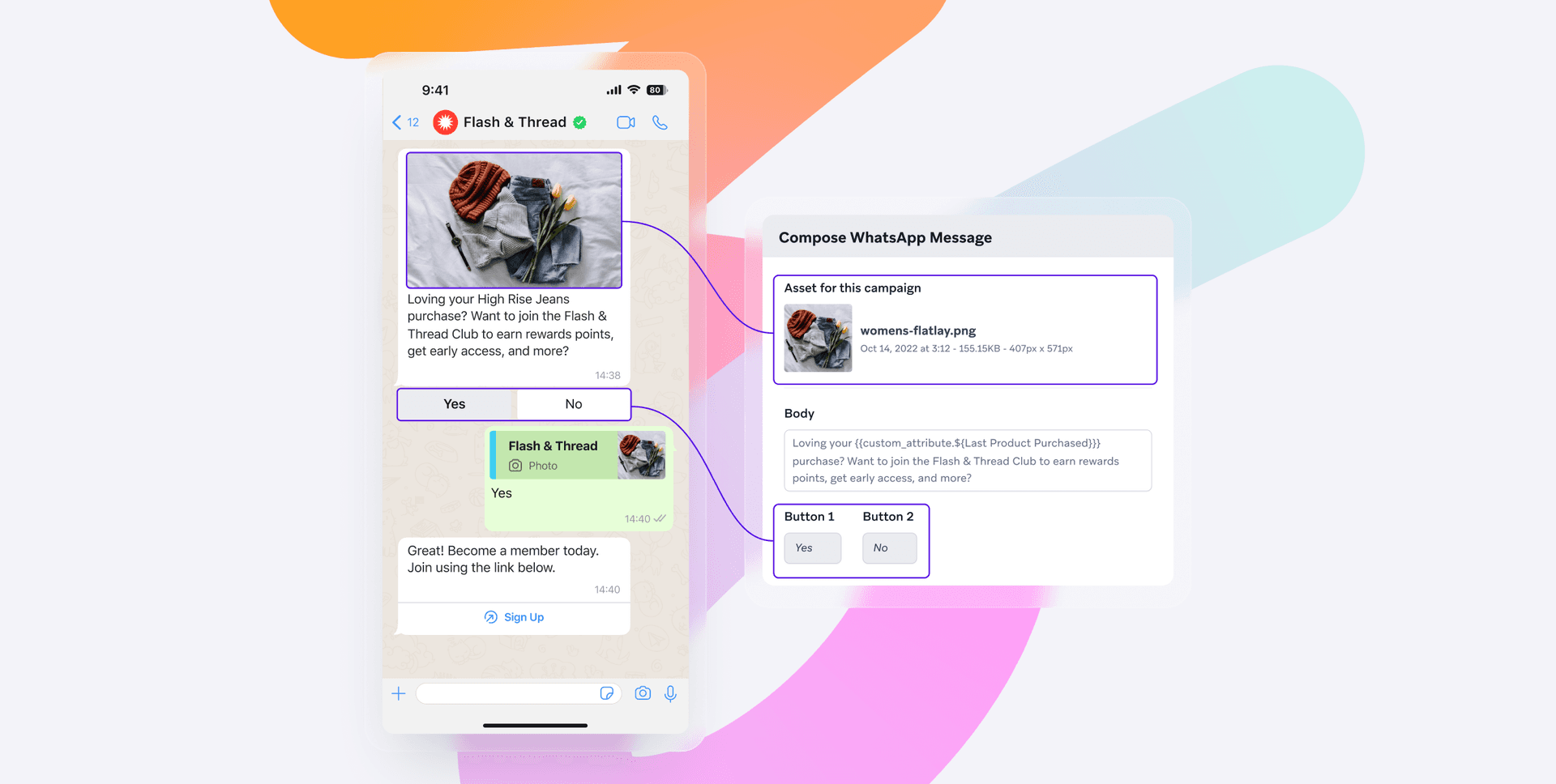
By making it super easy to join and showing clear benefits, you're more likely to keep customers coming back. And happy, loyal customers often spend more over time.
Pro Tip: Consider offering some exclusive deals just for your WhatsApp subscribers. It's a great way to reward your most high-value, engaged customers and maybe even get them to spread the word to their friends.
Remember, WhatsApp is all about having conversations with your customers. Keep it friendly, keep it helpful, and you'll be on your way to building great relationships with your audience.
4 Real life examples of WhatsApp marketing
Winning hearts and re-engagement with Floward
Floward is the go-to destination for online flowers and gifts delivery in MENA and the UK, known for its exceptional service, high-quality products, and effortless online experience. But beyond beautiful bouquets and thoughtful gifts, customer engagement is at the heart of Floward’s success. When customers feel connected, they come back, they share their experiences, and they trust the brand for their most meaningful moments. By creating personalized experiences and fostering genuine emotional connections, Floward builds loyalty, boosts satisfaction, and keeps customers engaged for the long haul.
The challenge—keeping love in bloom
Valentine’s Day is one of the biggest moments of the year for Floward—a time when emotions run high and gifting takes center stage. But with an influx of new customers and a wave of lapsed users, Floward faced a challenge: how to maximize engagement and conversions while reducing customer churn. High drop-off rates among first-time users and a struggle to re-engage past customers were impacting sales and overall brand visibility.
Floward needed a strategy that would not only capture hearts, but keep them coming back for more.
The strategy—A smart, data-driven approach to engagement
To turn the challenge into an opportunity, Floward teamed up with Braze to create an impactful cross-channel engagement strategy. Using Braze Canvas, they crafted personalized customer journeys across WhatsApp, push notifications, in-app messages, and email—ensuring the right message reached the right person at the perfect moment.
By leveraging Recency, Frequency, and Monetary (RFM) analysis, Floward segmented their audience to tailor campaigns based on customer behavior. This data-driven approach allowed them to send highly relevant messages that resonated with users, encouraging them to take action. Plus, with real-time data insights, they could continuously measure performance and refine their strategy for maximum impact.
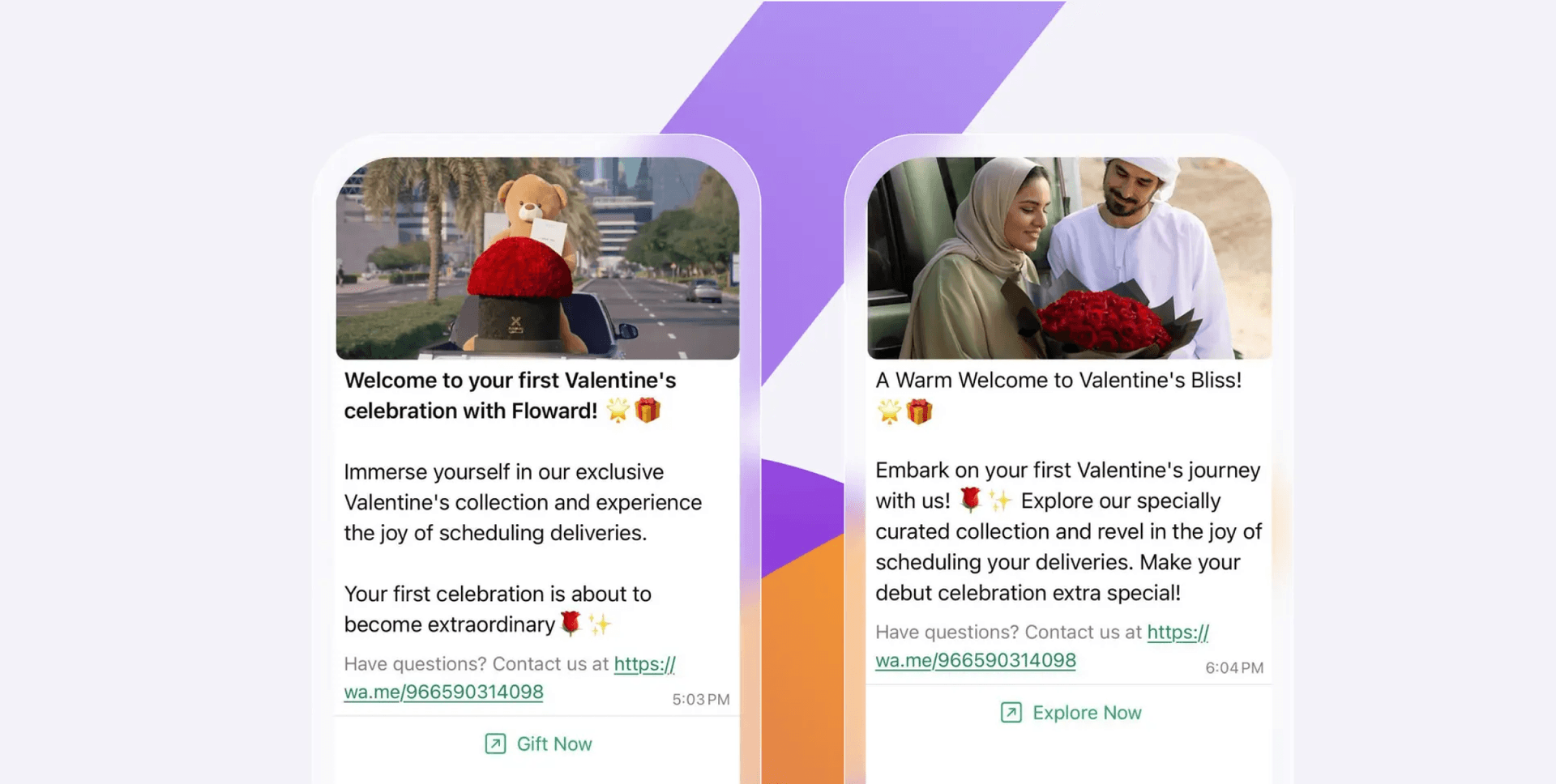
The results—stronger connections, higher conversions
Floward’s thoughtful, multi-channel approach paid off in a big way. Engagement and conversion rates soared, with WhatsApp emerging as the star performer, driving the highest revenue and re-engagement rates across all channels. Customers responded enthusiastically, leading to:
- Higher retention and lifetime value—keeping customers coming back for more
- A 21% increase in positive reviews, reflecting stronger customer satisfaction
- A 55% read rate for WhatsApp messages, proving its effectiveness as a key engagement tool
- A staggering 99.1% share of voice compared to direct competitors during the holiday period
By meeting customers where they were—and delivering messages that truly resonated—Floward strengthened brand loyalty, boosted engagement, and made Valentine’s Day even more memorable for its customers.
Turning missed orders into repeat customers the Rappi way
Since its launch in 2015 in Bogotá, Colombia, Rappi has redefined convenience in Latin America, growing into the region’s first superapp and serving users across nine countries and 300+ cities. More than just a delivery platform, Rappi connects people with solutions—whether it’s groceries, restaurant orders, prescription deliveries, or even hiring someone to stand in line for a product release. Their mission? To use technology to drive economic progress and make life easier for everyone, from everyday users to entrepreneurs and couriers.
With on-demand service at the core of their offering, Rappi knows that customer engagement is key. Keeping users active and engaged means they look to Rappi as an essential part of their daily routines. To strengthen relationships and build long-term loyalty, Rappi needed to meet customers where they were, delivering personalized, relevant messages that kept the brand top of mind.
The challenge—reaching customers at the right time
For Rappi, engagement means different things depending on where a user is in their journey. New users need to experience the value of the app quickly, while existing users benefit from timely, relevant deals that keep them coming back.
The challenge? Finding a more effective, out-of-product way to connect with users, especially those who had gone inactive. Rappi needed a direct, high-impact channel to re-engage lapsed users and encourage more frequent purchases from their active customer base.
The strategy—expanding to WhatsApp for smarter, more effective outreach
To solve this challenge, Rappi teamed up with Braze to extend their engagement strategy to WhatsApp—a widely adopted and highly trusted channel in Latin America. This move allowed them to:
- Re-engage lapsed users with personalized, targeted deals that brought them back to the platform.
- Encourage repeat purchases from active users by delivering exclusive offers directly to their mobile devices.
- Leverage data and insights to optimize campaigns, ensuring messages were timely, relevant, and effective.
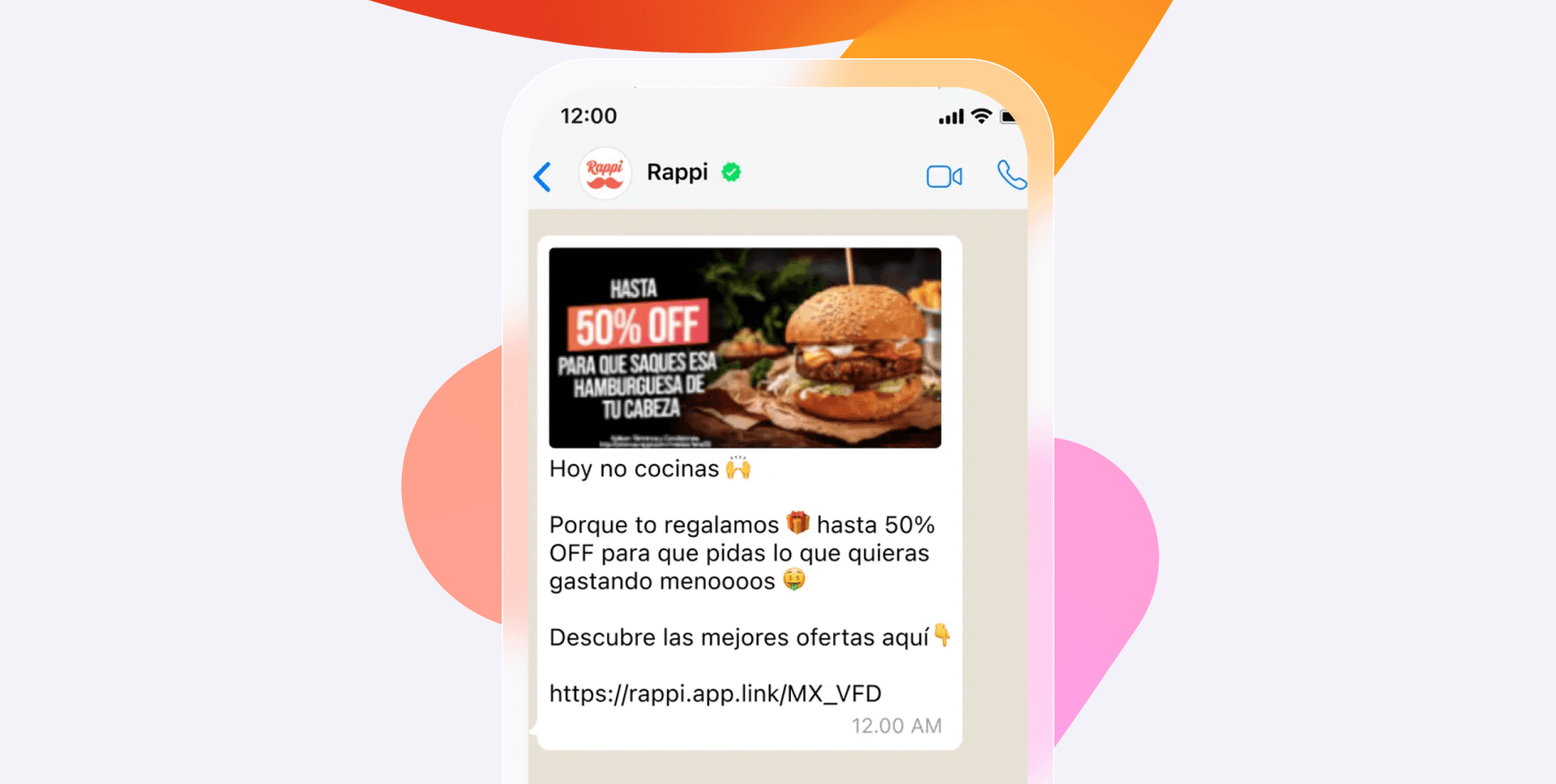
The results–A massive boost in engagement and sales
By meeting customers on a highly familiar and frequently used platform, Rappi’s WhatsApp strategy delivered outstanding results:
- 80% increase in users who made a purchase
- 28% lift in lapsed users who reactivated and made a purchase within 30 days
- 43% lift in reactivated users who made two or more purchases within 30 days
With Braze and WhatsApp, Rappi was able to reignite engagement, drive sales, and deepen customer relationships, reinforcing its position as an indispensable part of users' everyday lives.
Styli’s secret to keeping fashion shoppers engaged
Launched in 2019, Styli has quickly become a go-to eCommerce destination for trend-savvy shoppers in Saudi Arabia, the UAE, and beyond. With a mobile-first approach and a focus on affordable yet high-quality fashion, the brand has steadily gained market share, attracting a growing base of young, digital-native customers.
To keep these shoppers engaged across their entire journey, Styli prioritizes three key stages of customer engagement:
New customer activation – Ensuring first-time shoppers experience the value of Styli right away
- User engagement – Encouraging repeat visits and deeper interactions with the brand
- Customer retention – Building long-term loyalty through relevant, personalized experiences
By delivering targeted, personalized messaging, Styli aimed to drive more sessions, higher engagement, and increased sales—but they needed a scalable, efficient way to make it happen.
The challenge—creating personalized customer journeys at scale
Styli wanted to strengthen customer relationships and boost long-term value, but without overloading their technical teams. The goal was clear: deliver more relevant, engaging experiences across multiple touchpoints while making their marketing efforts more efficient and scalable.
The strategy—smarter engagement with Braze
To bring this vision to life, Styli partnered with Braze to enhance their engagement strategy. By leaning into a mix of dynamic tools, they were able to:
- Expand their channel mix – Incorporating in-app messages, Content Cards, and WhatsApp to connect with customers in meaningful ways.
- Deliver more relevant campaigns – Using Braze Catalogs to enrich messaging with tailored product recommendations.
- Automate and scale engagement – Streamlining their customer engagement program to deliver impact without requiring constant manual effort.
The results—stronger engagement, higher ROI, and faster execution
Styli’s data-driven, automated approach delivered impressive results:
- 50% boost in average ROI—making every marketing dollar work harder
- 15% rise in user activation—turning more first-time visitors into loyal customers
- 21% increase in sign-ups—expanding their customer base faster
- 40% reduction in campaign creation time—allowing the team to execute more efficiently
By combining strategic automation with personalized engagement, Styli didn’t just increase sales—they built stronger, longer-lasting connections with their customers, ensuring the brand stays top-of-mind in a fast-moving fashion market.
Stori improves the customer experience with interactive WhatsApp messaging
Stori, a leader in the Latin American Fintech space, provides digital financial solutions to those underserved by traditional banking, boasting a 99% credit acceptance rate and a 15% yield on deposit accounts. Committed to empowering individuals, Stori adopts a customer-centric approach by designing products in collaboration with users and focusing on their feedback, needs, and pain points. This dedication to customer satisfaction is key to Stori's goal of solidifying its position as the top fintech company in the region.
The challenge—improving the customer experience.
Stori recognized that some of its processes, such as updating user profiles and accessing account information, were challenging for customers to navigate. To address this, Stori is currently focusing on acquisition and retention across all stages of the customer lifecycle. In their initial WhatsApp campaigns with Braze, they identified two key points in the customer journey: an address update campaign for credit card replacements and a chatbot designed to transform potentially frustrating payment reminders into engaging and entertaining messaging experiences.
The strategy—more cohesive experiences
With Braze, Stori enhanced the customer experience by enabling users to update their addresses with a single click via WhatsApp messages. They also launched a campaign that provided easy access to important account information, such as balances and payment due dates. For the address update campaign, Stori segmented their audience to identify users needing to update their information for upcoming credit card replacements. They then sent a straightforward WhatsApp message requesting the necessary details, allowing for quick profile updates. By leveraging WhatsApp as a personal and high-touch channel, Stori achieved high conversion rates and improved their ability to serve customers effectively.
The results—stronger engagement and higher conversions
Stori's targeted campaign delivered, showing the effectiveness of their customer-centric approach:
- 3X more engagement with WhatsApp vs push notification. (Response rate)
- 26% higher conversion vs in-app process (Users that update their address)
Frequently asked questions (FAQs)
How do I measure WhatsApp marketing success?
To measure the performance of a WhatsApp campaign or journey, track metrics like read rate, click-through rate, and conversion rate. To measure the success of your WhatsApp program overall, track metrics like uplift in sessions, purchases, retention, and customer lifetime value.
Can I send bulk messages on WhatsApp?
Yes, using the WhatsApp Business Platform Cloud API, hosted by Meta for larger-scale messaging, you can send bulk messages on WhatsApp.
How do I set up a WhatsApp Business Account for marketing purposes?
Setting up a WhatsApp Business Account is a straightforward process. Here’s a clear step-by-step guide to help you get started:
- Connect WhatsApp to your customer engagement platform (WhatsApp may refer to this as your Business Solution Provider).
- Pro tip: Pick a platform that supports embedded sign-up flow.
- Create or select your Meta and WhatsApp Business Accounts. Most brands already have a Meta Business Account for their social accounts and/or ads.
- Create your profile.
- Verify your phone number.
- Complete business verification in order to send conversations at scale. This is done directly in the Meta Business Manager.
- Become an Official Business Account. Applying for Official Business Account (OBA) status gives your brand a blue check mark next to your display name. This adds legitimacy to your messaging on the platform and fosters customer trust.
- Scale your messaging limits. Messaging Limits determine the maximum number of business-initiated conversations each phone number can start in a rolling 24-hour period. You can scale to unlimited messaging in as little as four days.
- Collect opt-ins.
- Create your templates for approval in the WhatsApp Manager.
- Personalize and orchestrate your WhatsApp campaigns in your customer engagement platform.
Once your account is set up, you can start using WhatsApp to send marketing messages, share product information, and engage with customers effectively.
What are the key advantages of adding WhatsApp to my marketing mix?
The key advantages of adding WhatsApp to your marketing mix include high engagement rates, personalized messaging, efficient, streamlined customer interactions, cost-effectiveness, rich media capabilities, worldwide network, and the ability to build trust and stronger customer relationships by interacting with people on a platform they already use and are familiar with. This can lead to improved customer satisfaction and more sales.
What are some high-impact use cases for WhatsApp in business marketing?
Some examples of high-impact use cases for WhatsApp in business marketing are:
- Abandoned registration, sign-up, or onboarding dropoff
- Abandoned cart
- Loyalty program enrollment
- Sales and promotions
- Back-in-stock and low stock alerts
- Upselling and cross-selling
- Order updates and confirmation
- Customer surveys and product feedback
- New product announcements
- Content recommendation campaign
- Win-back campaigns
How can I grow my WhatsApp subscriber list?
The best way to get WhatsApp subscribers is to offer value-based incentives like discounts, VIP access, or helpful content in exchange for opt-ins. Consider promoting your WhatsApp channel across other platforms, like your website, landing pages, and social channels. Use phone number capture forms, QR codes, or links to collect opt-ins. How can I engage my WhatsApp subscriber list in creative ways?
To engage your WhatsApp subscriber list, you can offer VIP, exclusive content and deals to those who subscribe, personalize messages to increase engagement, make full use of the visual and interactive elements, run polls, quizzes, or contests. You can also gamify your messaging with quick replies, or even use video messages to tease upcoming launches or promote user-generated content. Above all else, offer genuinely helpful and relevant content for your audience.
What best practices should I follow to maintain a high-quality phone number rating on WhatsApp?
To maintain a high-quality phone number rating on WhatsApp, get user consent before sending any messages. They must opt-in. Don’t send too many messages or be too salesy in them. Monitor feedback, personalize your content, and give subscribers a mix of content types.
When using WhatsApp for business communications, it is essential to adhere to the WhatsApp Business Policy and Commerce Policy. This includes only sending messages to users who have opted in, ensuring that the content is highly personalized and useful, and avoiding open-ended welcome or introductory messages. Additionally, be mindful of messaging frequency to prevent overwhelming customers with too many messages in a single day. Lastly, optimize informational messages for both content and length to enhance their effectiveness and relevance.
How can WhatsApp's two-way messaging capabilities enhance customer engagement?
WhatsApp's two-way messaging capabilities can enhance customer engagement by allowing your business to have a real-time conversation with a customer. This means you can personalize interactions, give quick responses to queries or complaints and build the trust and loyalty between your brand and audience.
What types of content can I share through WhatsApp to drive customer actions?
You can share lots of types of content through WhatsApp to drive different customer actions, including:
Message types and features
- Text messages
- Images
- Videos
- Audio
- Document
- Product messages using your Meta Catalogs
- Quick replies
- Buttons (URL links, Call phone number)
Use cases
- Appointment reminders
- Sales, promo codes and discounts
- Order confirmations
- Price drop notifications
- Feedback requests
- Abandoned cart campaigns
- Buy it again/re-order campaigns
- Back-in-stock reminders
- Polls
- Customer support updates
- Low stock alerts
- Upsell campaigns
- Cross-sell campaigns
Does Braze support WhatsApp marketing?
In March 2023, Braze introduced native support for the WhatsApp channel, empowering brands to engage customers more deeply through real-time, two-way conversations at scale. Since then, our customers have significantly increased their use of the channel, with combined messaging volume growing massively.
With Braze | WhatsApp, marketers can quickly integrate and scale their WhatsApp programs by removing third-party senders and intermediaries. Once the channel is set up, they can effortlessly engage in real-time conversations with the right customers to capture attention and increase conversions. By unifying WhatsApp with other digital channels, marketers can optimize their spending and provide consistent experiences across all platforms.
Final thoughts
WhatsApp marketing presents an incredible opportunity for businesses of all sizes to connect with customers on a deeply personal level. From acquiring and activating new customers to driving sales through targeted promotions to nurturing loyalty and win-back, WhatsApp offers a versatile toolkit for achieving a wide range of marketing objectives.
Embracing WhatsApp as part of your cross-channel strategy is a smart move in today's mobile-first world.
The best marketing is about conversations, not just promotions. With WhatsApp, you have the chance to build meaningful connections with your customers—one message at a time.
As customer expectations shift, macroeconomic conditions continue to be unstable, and messaging channels emerge, brands need to find new ways to keep up. One way they can do that is to leverage WhatsApp. As the most popular 1:1 messaging platform in the world, WhatsApp offers marketers incredible potential when it comes to contacting their customers—if they know how to use it.
To help out, we assembled 20+ inspirational WhatsApp use cases that can be easily customized to your needs and help you activate, monetize, and retain customers through this powerful channel.
Forward-Looking Statements
This blog post contains “forward-looking statements” within the meaning of the “safe harbor” provisions of the Private Securities Litigation Reform Act of 1995, including but not limited to, statements regarding the performance of and expected benefits from Braze and its products. These forward-looking statements are based on the current assumptions, expectations and beliefs of Braze, and are subject to substantial risks, uncertainties and changes in circumstances that may cause actual results, performance or achievements to be materially different from any future results, performance or achievements expressed or implied by the forward-looking statements. Further information on potential factors that could affect Braze results are included in the Braze Quarterly Report on Form 10-Q for the fiscal quarter ended October 31, 2024, filed with the U.S. Securities and Exchange Commission on December 10, 2024, and the other public filings of Braze with the U.S. Securities and Exchange Commission. The forward-looking statements included in this blog post represent the views of Braze only as of the date of this blog post, and Braze assumes no obligation, and does not intend to update these forward-looking statements, except as required by law.
Related Tags
Be Absolutely Engaging.™
Sign up for regular updates from Braze.
Related Content
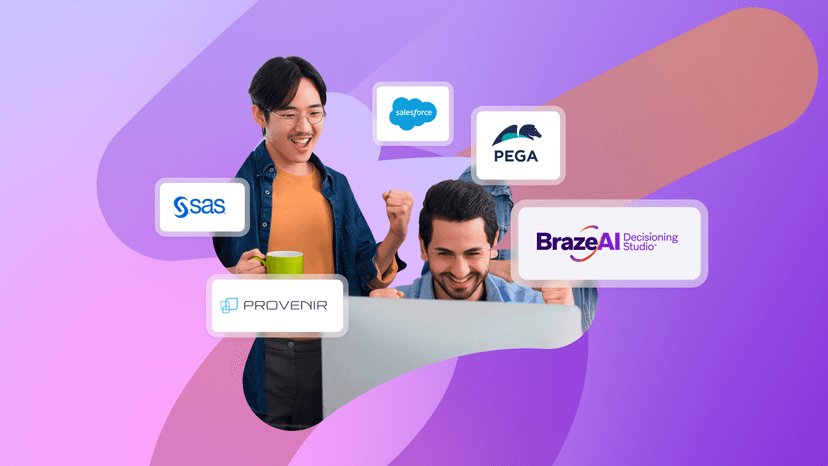 Article16 min read
Article16 min readChoosing the best AI decisioning platforms for 2026 (across industries)
February 12, 2026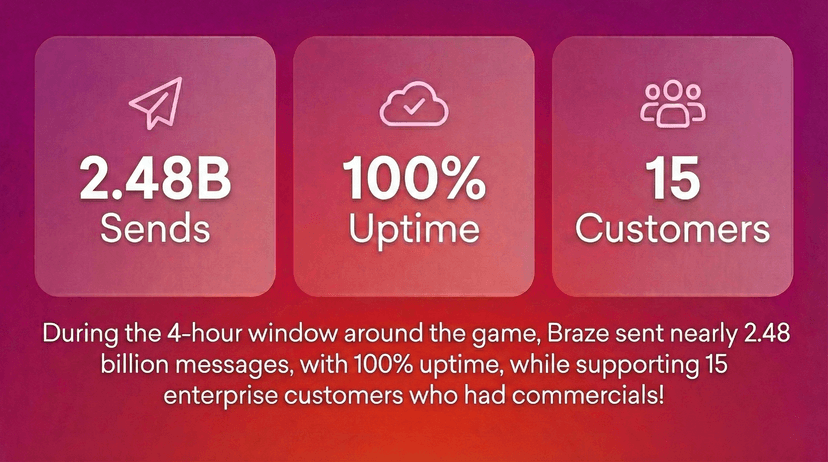 Article3 min read
Article3 min read2.4+ billion sends, zero fumbles: How Braze supports leading brands during the big game
February 09, 2026 Article4 min read
Article4 min readBeyond Predictions: Why Your Personalization Strategy Needs an AI Decisioning Agent
February 09, 2026